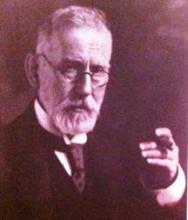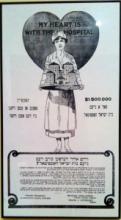The rich tradition of Jewish involvement in the medical profession is the subject of an exhibit now showing at New York’s Yeshiva University Museum. Trail of the Magic Bullet: The Jewish Encounter with Modern Medicine, 1860-1960 explores the social, cultural, religious, and scientific aspects of that relationship during the era of modern medicine.
The exhibit’s title references *Dr. Paul Ehrlich’s “magic bullet” salvarsan, the syphilis cure he discovered that was used until penicillin became available in the 1940s. One of five Jewish physicians profiled, Dr. Ehrlich (1854-1915) won the Nobel Prize in 1908 for his “Side Chain” theory, which helped explain how antibodies neutralize invaders. Born in Germany, Dr. Ehrlich never renounced his Judaism despite experiences with anti-Semitism.
Jews were often unwelcome in established areas of medicine such as surgery, so they embraced newly-emerging specialties including psychiatry, neurology and dermatology, according to the exhibit. In Germany, dermatology was called Judenhaut, or “Jews’ skin,” and psychoanalysis was known as the “Jewish Science.” A wall of the exhibit honors 28 Jewish pioneers in these fields, including psychoanalysis founder Dr. Sigmund Freud (1856-1939).
Another section illustrates the Jewish community’s role in establishing hospitals such as Newark (NJ) Beth Israel Hospital in 1924, as well as public health-oriented social service organizations and visiting nurse programs in the United States and abroad. While these institutions were founded to aid underserved segments of the Jewish population, they evolved to serve entire communities of Jews and non-Jews.
Discrimination and quotas, widespread nationwide until the 1950s, are addressed toward the end. One of several abhorrent displayed quotes is attributed to 1920-1935 Yale Medical School Dean Dr. Milton Charles Winternitz, addressing his admission committee: “Never admit more than five Jews, take only two Italian Catholics, and take no blacks at all.” Albert Einstein College of Medicine was founded by Yeshiva University as the first American medical school established under Jewish auspices, specifically with the aim of helping prospective Jewish medical students bypass such restrictions.
Magic Bullet ends with a modern examination of medical ethics from a Jewish perspective. A 15-minute film entitled Heal, You Shall Heal features physicians, rabbis, ethicists, and patients offering perspectives on genetic testing/pregnancy termination in the case of abnormality and end-of-life decisions. Rabbi Daniel S. Nevins, a dean at the Jewish Theological Seminary, says this: “As much as modern medical technology has given us a sense that we understand what is going on with the birth and death process, the truth is that these are moments of great mystery. It’s important for us to be humble in such moments.”
Trail of the Magic Bullet: The Jewish Encounter with Modern Medicine, 1860-1960 runs through Aug. 12, 2012.
-Miriam E. Tucker (@MiriamETucker on Twitter)
*CORRECTION 5/15/12: An earlier version of this article incorrectly spelled the name of Dr. Paul Ehrlich.



